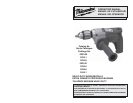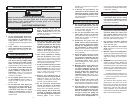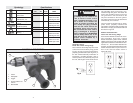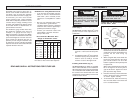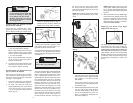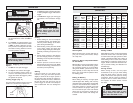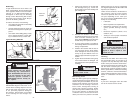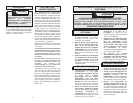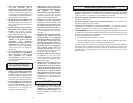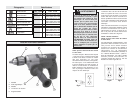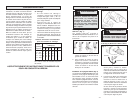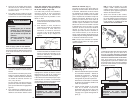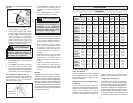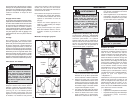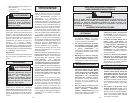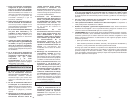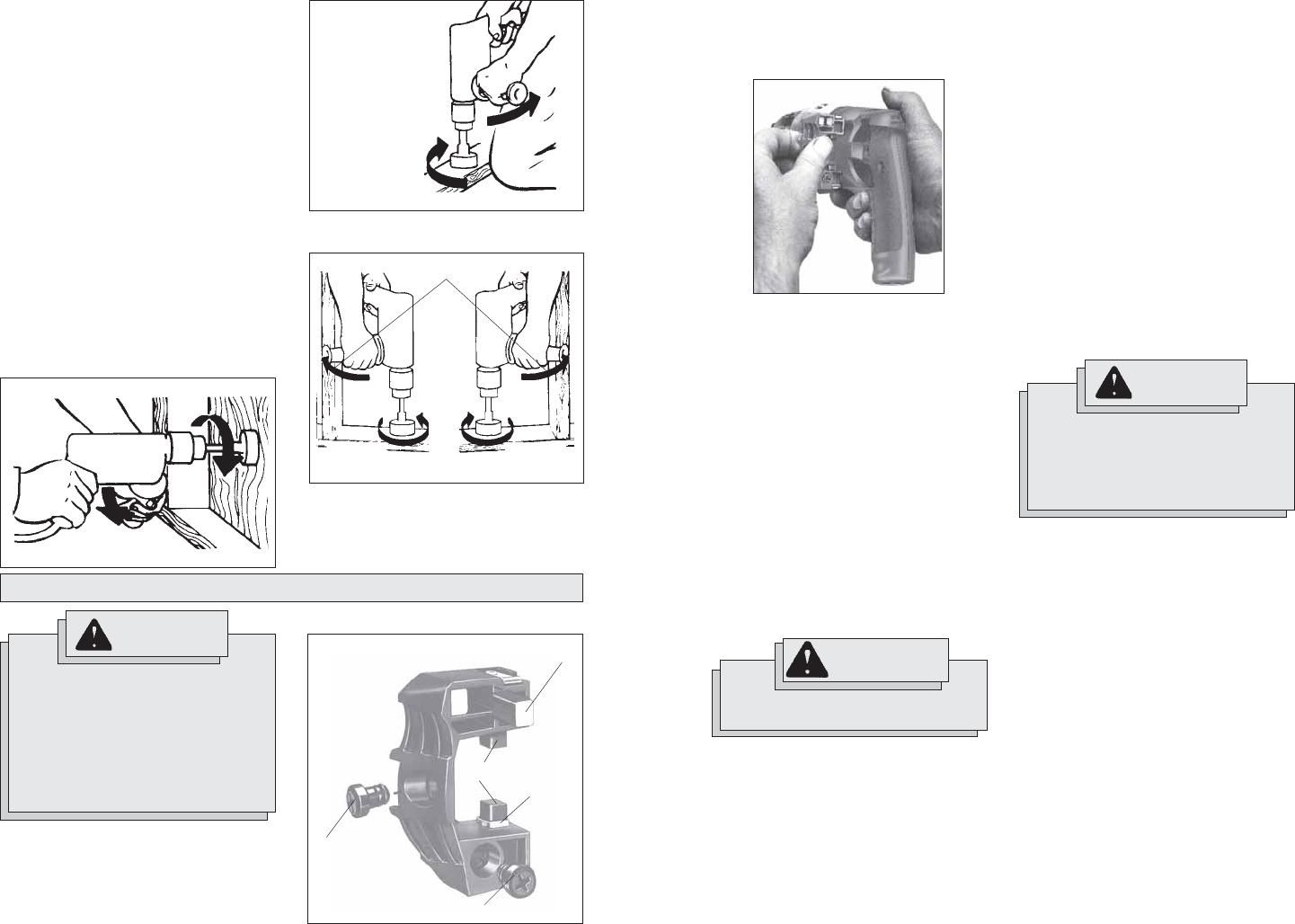
1312
Replacing Brushes (Fig. 15 & 16)
MILWAUKEE Magnum Drills have an ex-
clusive Brush Cartridge System. The tool
will not start when the brushes are worn
to 1/8", preventing expensive damage to
the armature. New brushes are provided
in the Cartridge for fast changes any-
where.
Brush holder
screw
Brushes
Extra brushes
Brush
holder
Replacement screw
Fig. 15
Fig. 16
To reduce the chance of bit binding:
• Use sharp bits. Sharp bits are less likely
to bind when drilling.
• Use the proper bit for the job. There are
bits that are designed for specific pur-
poses.
• Use caution when drilling pitchy, knotty,
wet or warped material or when drill-
ing in material that may contain nails.
Fig. 12
Forward rotation
Reaction
Bracing against the floor
Fig. 13
Forward
rotation
Bracing against your leg
Reaction
Bracing against a stud
Fig. 14
Reverse rotation
Reaction
Forward rotation
1. Unplug tool and rest it on its side with
the cartridge facing up. Loosen the
brush holder screw in the cartridge and
pull cartridge out.
2. Remove worn brushes. If the brushes
should fall into the tool, be sure to shake
them out before reinserting the car-
tridge. Discard BOTH brushes. Brushes
should always be replaced in sets.
3. A set of spare brushes is provided in
the cartridge. Remove the brushes from
storage compartment.
4. Position new brushes with the flat sil-
ver end facing into the brush holder.
Push cartridge into the tool and press
evenly on top and bottom of the car-
tridge to align terminals for proper con-
nection.
5. Tighten the brush holder screw gently.
If the head of Screw is damaged, use
the replacement screw provided in the
cartridge.
Never use a metal screw as a
brush holder screw.
WARNING!
WARNING!
To reduce the risk of injury,
always unplug your tool before
performing any maintenance.
Never disassemble the tool or try
to do any rewiring on the tool's
electrical system. Contact a
MILWAUKEE service facility for
ALL repairs.
MAINTENANCE
Maintaining Tools
Keep your tool in good repair by adopting a
regular maintenance program. Before use,
examine the general condition of your tool.
Inspect guards, switches, tool cord set and
extension cord for damage. Check for
loose screws, misalignment, binding of
moving parts, improper mounting, broken
parts and any other condition that may af-
fect its safe operation. If abnormal noise
or vibration occurs, turn the tool off imme-
diately and have the problem corrected
WARNING!
To reduce the risk of injury,
electric shock and damage to the
tool, never immerse your tool in
liquid or allow a liquid to flow
inside the tool.
before further use. Do not use a damaged
tool. Tag damaged tools “DO NOT USE” until
repaired (see “Repairs”).
Under normal conditions, relubrication is
not necessary until the motor brushes
need to be replaced. After six months to
one year, depending on use, return your
tool to the nearest MILWAUKEE service
facility for the following:
• Lubrication
• Brush inspection and replacement
• Mechanical inspection and cleaning
(gears, spindles, bearings, housing,
etc.)
• Electrical inspection (switch, cord,
armature, etc.)
• Testing to assure proper mechanical
and electrical operation
Cleaning
Clean dust and debris from vents. Keep
the tool handles clean, dry and free of oil
or grease. Use only mild soap and a damp
cloth to clean your tool since certain clean-
ing agents and solvents are harmful to plas-
tics and other insulated parts. Some of
these include: gasoline, turpentine, lacquer
thinner, paint thinner, chlorinated cleaning
solvents, ammonia and household deter-
gents containing ammonia. Never use flam-
mable or combustible solvents around
tools.
Repairs
If your tool is damaged, return the entire
tool to the nearest service center.
Bit Binding
A high rotational force occurs when a bit
binds. If the bit binds, the tool will be forced
in the opposite direction of the bit rotation
(See Fig. 12 - 14). Bits may bind if they are
misaligned or when they are breaking
through a hole. Wood boring bits can also
bind if they run into nails or knots. Be pre-
pared for bit binding situations.
Typical Bracing Methods



